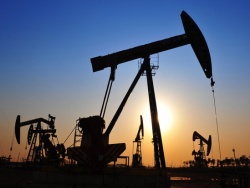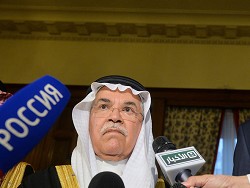Aleksey Topalov
 Jon Gambrell/Areregular petroleum (Doha, April 2016)
Jon Gambrell/Areregular petroleum (Doha, April 2016)
Fixing the production to stabilize prices will be the main topic of the meeting of the countries – manufacturers of oil. According to experts, to negotiate again will fail since in reality interested in freezing only a handful of countries led by Venezuela. Other producers, including Russia, aimed to increase production and exports.
Monday, September 26, opens the international energy forum in Algeria, a key topic which should be to the negotiations of the countries – oil producers on joint efforts aimed at stabilizing oil prices.
The forum should be held an informal meeting of representatives of the Organization of countries – exporters of oil from other major producers, particularly Russia, whose delegation will be headed by energy Minister Alexander Novak. The exact date of the talks is not known, however earlier it was reported that they will be held on the last day of the forum, on September 28.
We are talking about the freezing of the level of oil production, what producers are trying to negotiate with the beginning of 2016. Then the initiators of the talks was Russia, Saudi Arabia and Venezuela, other countries supported the idea, however, the conclusion of the final agreement fell through. Opposed by Iran. He initially supported the initiative, but later changed my mind. Sanctions of the USA and Europe, restricting the export and, consequently, the production of Iranian oil, were not abolished until mid-January, Iran agreed that, until it reaches to the pre-sanctions level of production, the interruption may not be considered.
After Iran refused to commit loot and Saudi Arabia, who consider that the restrictions should apply to all manufacturers. Incidentally, Russia then declared that the freezing would work and without Iran because of its support in the country, providing 73% of world production.
At the time of the failure of past negotiations (April 17) oil cost $42,85 per barrel. At the beginning of the trading day on 26 September at the Intercontinental exchange ICE November futures for Brent traded at a price of $46,05 (+0,3%).
According to Bloomberg, the Russian delegation can leave the forum even before negotiations on the freezing. According to the Agency sources, Russia hopes that the OPEC countries first agree among themselves, and only in this case Russia will take part in the discussion.
Says the leading expert of the Union of oil and gas producers of Russia Rustam Tankan, the main risks for an agreement to freeze now associated with the fact that in reality it is needed in only a few countries — Venezuela, Ecuador and Algeria.
Venezuela, by the way, was the initiator of the idea of freezing. The country is in deep economic and political crisis, and oil exports is more than 95% of all foreign supplies Venezuela. The economy is 90% dependent on oil revenues, but most of Venezuela’s oil projects are now actually operating at a loss. In January 2016, oil prices fell below $30, and at this price, oil production in Venezuela becomes almost unprofitable.
In Ecuador, the economic situation is also dire, in the list of world’s worst economies in the country occupies the 4th place, behind only Venezuela, Greece and Brazil. As in Venezuela, oil is the main article Ecuadorian exports.
Algeria reduced production because of depletion of fields, that is, to freeze it now would be very timely.
In addition, the limitation of production can be interested in Nigeria, which has periodically reduced supply because of attacks by radical groups aimed at pipelines and tank farms. However, in Nigeria the situation is constantly changing.
But other countries, according to Tankaev, freezing is not interested and considering the idea only from the point of view of manipulating the market through verbal intervention.
The partner of company Rusenergy Michael Krutikhin also thinks that the agreement on the limitation of production will not succeed this time. And the reason will again serve as Iran, where production has not yet reached the pre-sanctions targets. Earlier, the national Iranian oil company said that the country will be able to produce 4 million barrels a day until the end of 2016 or early 2017.
“And seeing that Iran freeze prey is not going to abandon the idea and other countries, primarily Saudi Arabia”, says Krutikhin.
Head of sector of Iran, Institute of Oriental studies Nina Mamedova, on the contrary, believes that Iran is ready to record the proceedings. At the moment it has reached 3.7–3.8 million barrels per day, that is, the problem of increasing production is actually solved.
Russian energy Minister Alexander Novak said that the price in the range of $40-50 per barrel is “quite normal” for Russia.
And on Sunday the Russian official said that the market will find its equilibrium, regardless of whether an agreement was reached on the freezing of oil. To balance it should come in the second half of this year.
For any manufacturer, the important price of oil, but also important and the market share that countries-oil producers are afraid to lose, freezing the level of production. There are concerns that even upon reaching a formal agreement to abide by it will not, that is, will benefit at the expense of those who produce still fix, to take off and market share. This confirms the fact that OPEC itself has long been can not withstand the production quotas (30 million barrels per day): countries of the cartel produce more consistently at 1.5–2 million barrels a day.
Another extremely important point is the cost of production (see chart). And it can vary significantly not only depending on the country, but even from the project. The same Iran, for example, the average cost is $12.6 V, but according to Nina Mamedova, Iran has the projects in which the cost of production of a barrel of oil is only about $1.

It should be understood that usually we are talking about operating costs (actually for the extraction of a barrel) and capital expenditure (e.g. for infrastructure projects). “But the overall costs per barrel include the servicing and repayment of loans companies”, — says Rustam Tankan.
In addition, according to Mikhail Krutikhin, consider the logistic and administrative costs, social burden and the tax component. And here the situation of the countries is very different. For example, in Russia taxes and the administrative costs play a very important role. “Thus, in Russia the average total cost of production is about $27 (that is 50% higher than the actual operating expenses and capex), and, for example, in Saudi Arabia — only $10-12,” says Krutikhin.








